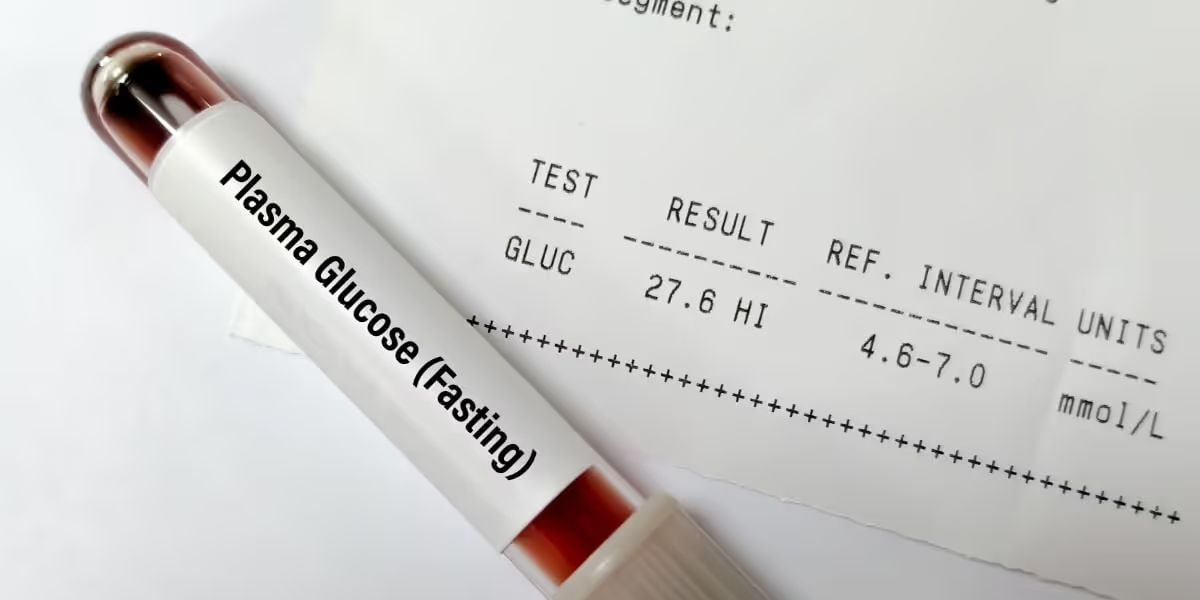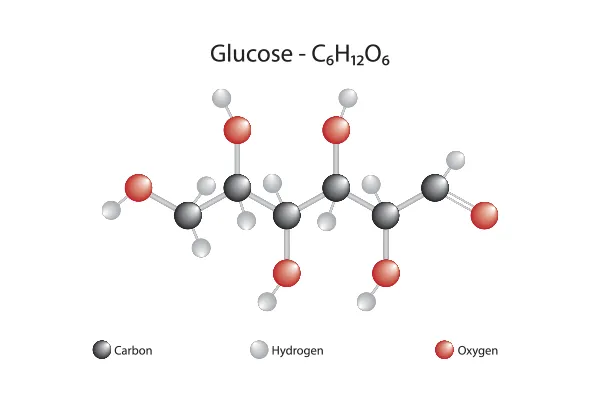Fasting Glucose Blood Test (FBS)
A fasting glucose test—also known as a fasting blood sugar (FBS) test, fasting plasma glucose (FPG) test, or fasting blood glucose (FBG) test—is a simple blood test that measures the amount of glucose (sugar) in your bloodstream after you’ve fasted for at least 8 hours. Glucose is the body's main source, and its regulation is crucial for overall health. Fasting glucose is one of several blood tests used to assess your risk of diabetes and other metabolic conditions.

Fasting Glucose Test Australia, Book Your FBS Test Today
What:
Blood biomarker
Tests for:
Diabetes Risk
Referral:
Required
Member cost:
$30-$60
Why Is Fasting Glucose Important?

Glucose is your body’s primary energy source. But when fasting glucose levels are consistently elevated, it may signal insulin resistance, prediabetes, or type 2 diabetes (medical conditions such as diabetes mellitus)—conditions that often develop silently over years. Left unchecked, high glucose levels can be a sign of a medical condition and can damage blood vessels, nerves, and organs, increasing your risk of heart disease, stroke, kidney failure, and cognitive decline.
What Does the Fasting Glucose Test Measure?
The test measures the concentration of glucose in your blood after an overnight fast. It reflects how well your body regulates blood sugar without the influence of recent meals. Elevated fasting glucose levels can indicate impaired insulin function or glucose metabolism. This test helps determine if your blood sugar is within a healthy range.
What Is a Normal Fasting Glucose Level in Australia?

According to Australian guidelines:
- Normal: 3.0–5.4 mmol/L
- Prediabetes: 5.5–6.9 mmol/L
- Diabetes: ≥7.0 mmol/L
Who Should Get a Fasting Glucose Test?
You should consider this test if you:
- Are over 40
- Have a family history of diabetes (it's important to consider your medical history when assessing your risk)
- Are overweight or have a sedentary lifestyle
- Have high blood pressure or cholesterol
- Have a history of gestational diabetes
- Are at high risk due to certain risk factors, such as previous medical conditions
- Experience symptoms like fatigue, excessive thirst, or frequent
How to Prepare for a Fasting Glucose Test
- Fasting: Fast overnight—do not eat or drink anything except water for 8–12 hours before the test.
- Medications: Continue taking prescribed medications unless advised otherwise by your doctor.
- Avoid: Smoking, alcohol, and strenuous exercise before the test, as they can affect results.
Preparing for Your Appointment: Tips for a Smooth Experience

Getting ready for your blood glucose test doesn’t have to be stressful. To make your appointment as smooth as possible, start by carefully following your doctor’s instructions—especially if you’re scheduled for a fasting blood glucose test or an oral glucose tolerance test. Remember, you’ll need to fast for at least 8 hours before the test, so plan your meals and snacks accordingly the night before.
It’s also a good idea to bring a list of any medications you’re currently taking, as some medicines can affect your test results. Let your doctor know about your full medical history, including any previous blood tests, diabetes diagnoses, or related health concerns. Jot down any questions you have about blood sugar, blood glucose levels, or blood glucose monitoring so you don’t forget to ask during your visit.
If you’ve had other tests or have noticed changes in your blood sugar levels, bring those results along. Being prepared helps your healthcare provider get a complete picture of your health and ensures you get the most out of your appointment. With a little planning, you’ll feel more confident and ready to take charge of your blood glucose management.
The Testing Process: What Happens During Your FBS Test
When you arrive for your fasting blood glucose test, the process is quick and straightforward. After confirming that you have fasted for at least 8 hours—meaning you haven’t eaten or had anything to drink except water—a healthcare professional will guide you through the test. Using a small needle, they will draw a blood sample from a vein in your arm. This blood sample is then sent to a laboratory, where your blood glucose level is measured, typically reported in millimoles per liter (mmol/L) or milligrams per decilitre (mg/dL).
The fasting blood sugar test is usually scheduled in the morning to ensure the most accurate results, as your body’s glucose levels are less likely to be influenced by recent meals or physical activity. It’s important to follow your healthcare provider’s instructions carefully, including fasting for several hours before the test, to ensure your results reflect your true fasting blood glucose. The entire process is quick, minimally invasive, and provides essential information about your blood sugar and overall health.
In addition to laboratory blood tests, blood glucose can also be measured at home using a finger prick. This method involves using a glucose meter and a test strip to quickly check your blood sugar levels. The convenience of finger prick testing with a glucose meter and test strip makes it easier for people, especially those with diabetes, to monitor their blood glucose daily and manage their health effectively.
What to Expect from Your Doctor: Questions and Guidance

During your appointment, your doctor will take the time to understand your overall health and any concerns you may have about blood sugar or diabetes. Expect questions about your medical history, current symptoms, and lifestyle habits, as these details help identify diabetes risk factors and guide your care. Your doctor may also perform a physical exam and recommend additional blood tests, such as a random blood glucose test or a glucose tolerance test, to get a clearer picture of your blood glucose levels.
Don’t hesitate to ask your doctor about anything on your mind—whether it’s understanding the difference between low blood sugar and high blood sugar, learning about healthy blood glucose levels, or exploring treatment options like glucose lowering medication or insulin therapy. Your doctor can also explain the benefits of continuous glucose monitoring and help you set a target range for your blood sugar levels.
By having an open conversation and asking questions, you and your doctor can work together to create a personalised plan that fits your needs and supports your long-term health. Remember, your healthcare team is there to guide you every step of the way.
What Affects Fasting Glucose Levels?
Several factors can influence your fasting glucose levels:
- Diet: High intake of refined carbohydrates and sugars.
- Physical Activity: Lack of regular exercise.
- Stress: Chronic stress can increase glucose levels.
- Sleep: Poor sleep quality or duration.
- Medical Conditions: Other existing medical conditions can impact blood sugar management and interpretation of results.
- Medications: Certain drugs, including glucose lowering medication, can affect blood sugar.
What Do the Results Mean?
- Normal: Indicates healthy glucose metabolism.
- Prediabetes: Suggests increased risk of developing diabetes; lifestyle changes are recommended.
- Diabetes: Requires medical management for disease control, including keeping blood sugar within your target range to prevent complications.
High blood glucose levels may indicate diabetes, prediabetes, or other conditions, and often require further management to reduce health risks.
Fasting glucose tests are commonly used to help diagnose diabetes and prediabetes, and are often combined with other tests for a comprehensive diagnosis.
Risks and Limitations of the Test
- Single Snapshot: Provides a one-time measurement; may not reflect daily fluctuations.
- Influencing Factors: Stress, illness, and medications can affect results.
- Further Testing: Abnormal results may require your doctor to order other tests or separate tests, such as two separate tests like the HbA1c and oral glucose tolerance test, to confirm a diagnosis.
Importance of Regular Testing for Your Health
Regular blood glucose testing is a cornerstone of effective diabetes management and prevention. Blood glucose tests and blood sugar tests are essential tools for diagnosing, monitoring, and managing diabetes. Monitoring your blood sugar levels helps you and your healthcare provider identify trends, catch high blood sugar early, and address risk factors before they lead to serious complications. The American Diabetes Association recommends routine testing for people with diabetes, as well as those with risk factors such as a family history of diabetes, obesity, or a history of gestational diabetes.
By keeping track of your blood glucose levels, you can make informed decisions about your diet, physical activity, and medication. Early detection of high blood sugar levels can help prevent complications like cardiovascular disease, kidney damage, and nerve problems. Regular testing empowers you to take control of your health, adjust your lifestyle as needed, and work closely with your healthcare team to maintain healthy blood sugar levels.
How Does Fasting Glucose Relate to Long-Term Health?
Consistently high fasting glucose levels can lead to:
- Cardiovascular Disease: Increased risk of heart attacks and strokes.
- Kidney Damage: High glucose can impair kidney function.
- Nerve Damage: Leading to neuropathy.
- Vision Problems: Including retinopathy.
Coping and Support: Managing Emotions and Finding Help
Managing diabetes and keeping your blood sugar levels in check can sometimes feel overwhelming, but you don’t have to do it alone. Emotional support is just as important as medical care when it comes to diabetes management. Connecting with others—whether through in-person or online support groups—can provide encouragement, practical tips, and a sense of community.
Consider reaching out to a diabetes educator or a registered dietitian for expert advice on healthy eating, physical activity, and blood glucose monitoring. These professionals can help you develop strategies for managing your blood glucose levels and offer support when challenges arise. The Diabetes Australia is another excellent resource.
Remember, it’s normal to have good days and tough days. Don’t be afraid to ask for help, share your feelings, or seek guidance when you need it. With the right support, you can navigate the journey of diabetes management and maintain a healthy, balanced lifestyle.
Next Steps After Your Fasting Glucose Test
Once you receive your fasting glucose test results, your healthcare provider will review them with you and discuss what they mean for your health. If your blood sugar levels are higher than normal, your provider may recommend further testing, such as an oral glucose tolerance test, to confirm whether you have diabetes or prediabetes. The oral glucose tolerance test involves drinking a glucose solution to measure how your body processes sugar. This additional glucose test helps provide a clearer picture of how your body processes sugar.
If you are diagnosed with diabetes, your healthcare provider will work with you to create a personalised treatment plan. This may include lifestyle changes, medication, or insulin therapy, depending on your needs. Ongoing monitoring is essential, and your provider may suggest continuous glucose monitoring or regular blood glucose testing to track your progress. Attending follow-up appointments and sticking to your treatment plan are key steps in managing your blood sugar and reducing the risk of complications.
How to Improve Fasting Glucose Levels

- Diet: Adopt a balanced diet rich in whole grains, lean proteins, and vegetables.
- Exercise: Engage in regular physical activity.
- Weight Management: Maintain a healthy weight.
- Stress Reduction: Practice relaxation techniques.
- Sleep: Ensure adequate and quality sleep.
Recommendations for improving fasting glucose may vary depending on individual health factors such as age, medical conditions, and current medications.
When making lifestyle changes, be cautious to avoid low blood glucose levels or low blood sugar, especially if you are taking medications like insulin, as overcorrection can lead to hypoglycemia.
Treatment Options for Diabetes in Australia
Managing diabetes in Australia involves a comprehensive approach tailored to each individual’s needs. Treatment options include lifestyle changes such as healthy eating, regular physical activity, and weight management, all of which help control blood sugar levels. Blood glucose monitoring is an essential part of diabetes management, allowing you and your healthcare team to track your progress and make adjustments as needed. The HbA1c test measures your average blood sugar levels over several months by analysing the amount of sugar attached to haemoglobin in your red blood cells.
For many people with type 2 diabetes, medications like metformin or sulfonylureas may be prescribed to help lower blood glucose. Insulin therapy is often necessary for those with type 1 diabetes and may be required for some with advanced type 2 diabetes. In type 1 diabetes, the immune system attacks the insulin making cells in the pancreas, leading to insulin deficiency. Support is available through diabetes educators, support groups, and online resources, helping you stay informed and motivated. Working closely with your healthcare provider ensures your treatment plan is effective and fits your lifestyle, supporting long-term diabetes management and better health outcomes.
Clinical Trials and Research: The Future of Diabetes Care
Ongoing clinical trials and research are shaping the future of diabetes care in Australia and around the world. Researchers are continually working to develop new medications, devices, and therapies to improve the lives of people with diabetes. Innovations such as continuous glucose monitors and artificial pancreas systems are already transforming diabetes management, making it easier to track glucose levels and maintain better control.
By participating in clinical trials, individuals with diabetes can access cutting-edge treatments and contribute to the advancement of medical knowledge. Organisations like the Juvenile Diabetes Research Foundation and government agencies are investing in research to find more effective ways to prevent, manage, and ultimately cure diabetes. Staying informed about new developments and supporting research efforts helps pave the way for a healthier future for everyone affected by diabetes.
Additional Resources for Patients and Families
If you’re seeking more information or support for managing diabetes, there are many trusted resources available to help you and your loved ones. The Cleveland Clinic and the Diabetes Australia both offer comprehensive guides on diabetes management, including blood glucose testing, insulin therapy, and tips for maintaining a healthy lifestyle.
Online support groups and forums can connect you with others who understand what you’re going through, providing a space to share experiences and advice. Your doctor or diabetes educator may also recommend local resources, such as diabetes support groups, healthy cooking classes, or educational workshops, to help you stay on track with your blood glucose monitoring and management.
By taking advantage of these resources, you can stay informed, motivated, and empowered to manage your diabetes and maintain a healthy range of blood sugar levels. Always consult your healthcare provider before making changes to your diabetes management plan, and remember that support is available whenever you need it.
Sources
1. Healthdirect Australia – Blood glucose test
https://www.healthdirect.gov.au/blood-glucose-test
2. Diabetes Australia – What is diabetes
https://www.diabetesaustralia.com.au/about-diabetes/what-is-diabetes/
3. World Health Organization – Diabetes
https://www.who.int/health-topics/diabetes#tab=tab_1
4. Cleveland Clinic - Fasting Blood Sugar Test
https://my.clevelandclinic.org/health/diagnostics/21952-fasting-blood-sugar
Get On Top Of Your Fasting Blood Sugar Levels
In just a few minutes, the fasting blood sugar (FBS) test offers vital insight into your metabolic health and can catch pre-diabetes or diabetes long before symptoms appear. By combining regular screening with healthy lifestyle choices—balanced eating, exercise and stress management—you’ll be empowered to protect your long-term well-being. Book your FBS test in Australia today to take proactive control of your blood sugar and safeguard your health.
.avif)
Additional FAQs


imaging

biomarkers

sterols
Book a Free Discovery Call
Join 20,000+ Australians improving their health with proactive, personalised healthcare.